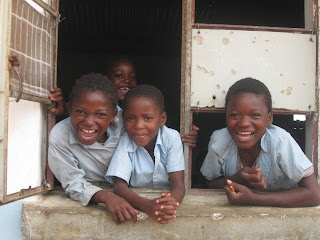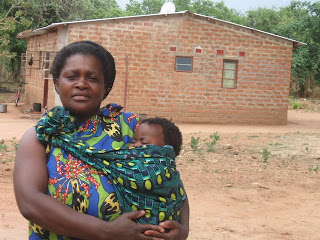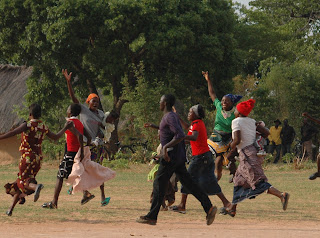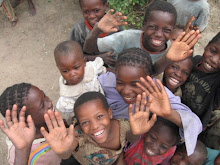

The school is in dire need of a new bore hole and the mono pump constantly breaks down. We noticed the children were drinking from a large barrel of stagnant water, sharing the same plastic cups. There is no power on-site (i.e. solar and battery power is possible if there were funds) and this is a deterrent in recruitment and retention of staff.
Education is paid for in Zambia only until grade 7. Families have to come up with the money for high school, they said they usually do this by selling whatever farm products they are able to (i.e. livestock), and so with the abject poverty in the area there is little chance most children, especially girls, will attend school beyond grade 7.
Despite this, parents seem to place education as a high priority and try to pay for even part of their child’s secondary education through whatever means necessary. This is a huge strain on parents trying to care for many children and often with little means. It would take so little by our financial standards to help the school get the work done. I won’t soon forget the Namununga School, the students and teachers, and have seriously contemplated how we may be able to help somehow in the future!

 With Simon and the girls in their Sunday dresses.
With Simon and the girls in their Sunday dresses.
Pastor Enoch's church
 Pastor Enoch (pictured below, to the right of Bruce) was Mr. Wilson’s (far right) brother and also a recipient of a HFH home. He and his wife Fidas and their five children were very happy to be a part of this build, and were so kind and helpful to everyone.
Pastor Enoch (pictured below, to the right of Bruce) was Mr. Wilson’s (far right) brother and also a recipient of a HFH home. He and his wife Fidas and their five children were very happy to be a part of this build, and were so kind and helpful to everyone.
Simon also volunteers for the Catholic Relief Outreach Centre, 20 minutes away from where we stayed and brought us for a visit there. Here a small staff, paid through ‘honorarium’ type salaries, care for orphans and vulnerable people in the surrounding area.


Logic (above), who works with the Outreach Centre, often uses his bike to do his work and was tunning it one day while he came to visit Mr. Wilson's. He said his bike, like so many others in the area, was given through a donation program run by an NGO and this mode of transportation is invaluable to him in his work. He and the rest of the staff check in on vulnerable people in the community, educating them and trying to provide support even when resources are not available. They work with many of the families caring for orphans (including one that lived with Mr. Wilson's family), and they try to ensure the children are being taken care of while assessing whether there is a risk of abuse or neglect. I enjoyed talking with him about community work and about his own family, wife Phoebe (also a staff at the Centre) and daughter Mace, pictured below.

The women staff at the Centre bring their babies to work with them. Logic explained to us that because they cannot bike to work until the children are older, walking to and from their outreach assignments takes much longer and extends their work day. I can't imagine how physically exhausting this is, not to mention how the work itself would drain you mentally.

We were told there are over 1000 orphans in their district, many of whom are staying with friends or family and who need support, but they are only able to manage a caseload of less than 500. The staff at the Outreach Centre explained to us how ARVs (antiretroviral drugs used in the treatment of Aids) are free but accessibility and transporting them is somewhere between difficult and impossible. Drugs and Medical supplies are virtually non-existent, and the Centre operates on an extremely low budget - barley managing to pay rent in their run-down tiny building. The Centre also provides family planning support and education on reproductive health, but they often have to refer people to the nearby clinic - which we also visited.

Unfortunately the clinic was also short on equipment and again, no medication available with only one male nurse on staff. This is consistent with the inadequacy of the healthcare system elsewhere in the country, with high patient numbers, lack of infrastructure and too little staffing (in 2006 there were only 646 doctors with a population of almost 12 million, under a third of the doctor-patient ratio recommended by WHO). We were told by locals that the best you can hope for when visiting the clinic is some medical advice, bandages or a bed to deliver your baby. Very sad indeed… We are so spoiled in our land of medical services & supplies aplenty.
*A note on Aids in Zambia
Zambia has one of the world’s most devastating HIV and AIDS epidemics. More than one in every seven adults in Zambia is living with HIV and the life expectancy at birth has fallen to just 42 years - compounding Zambia’s existing economic problems. Aids and Aids-related illnesses are rampant in the country and although the numbers tend to be lower in rural areas, treatment is more accessible for those living in urban areas. Although the country has made huge strides in educational and health programs, utilizing NGO’s, faith-based organizations and even the private sector, the health system has suffered years of under-investment and has now been brought to the brink of collapse by the AIDS epidemic. In the past four decades since the country has been independent, peace has been established but prosperity is still a dream and Zambia remains one of the poorest and least developed nations on earth. Success or failure in dealing with the Aids epidemic is a critical factor in determining the country’s future.

 ... the second in front of her home built with the help of Habitat for Humanity!
... the second in front of her home built with the help of Habitat for Humanity!












No comments:
Post a Comment